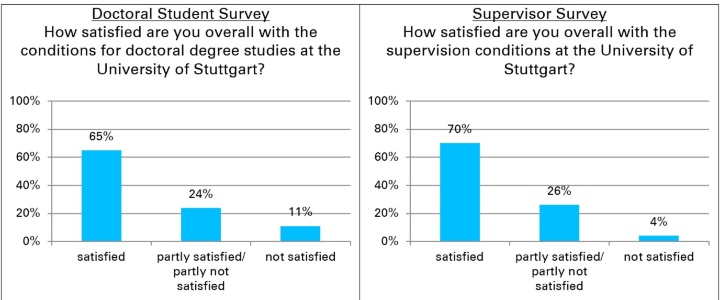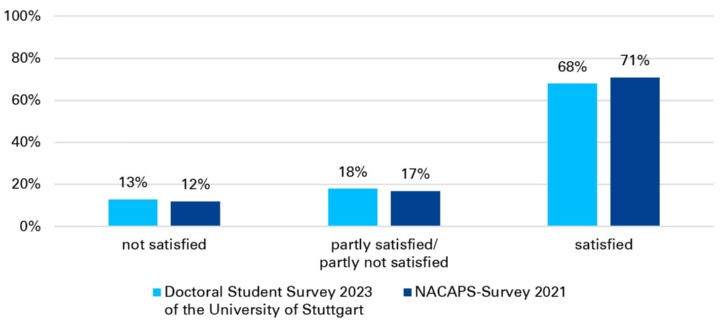65 percent of the doctoral researchers who took part in the survey stated that they were satisfied with the doctoral study conditions at the University of Stuttgart, with a further 24 percent stating that they were partially satisfied. Many participants particularly appreciated the "freedom to conduct research projects" and "the opportunity for independent academic work." According to the survey, the high-quality professional support and the commitment shown by supervisors also contribute to overall satisfaction. More than two thirds of survey participants feel well supported.
In order to obtain a holistic picture, the university also surveyed the supervisors: 70 percent of the survey participants were satisfied with the supervision conditions. They particularly highlighted the freedom in shaping doctoral projects, conducting research and teaching, as well as the creative flexibility, productive working atmosphere, and stimulating academic environment. Additionally, they appreciated the numerous collaboration opportunities both within the university and with external partners from academia and industry.

The University of Stuttgart is attractive for young researchers
“The survey confirms that the University of Stuttgart is an attractive location for early career researchers. However, we are committed to building on this success and continuously improving the conditions within the doctoral degree system," says Prof. Judith Tonhauser, Vice Rector for Early Career Researchers and Diversity at the University of Stuttgart. “This can only succeed if we work together, in dialog with all those involved. I am therefore grateful that a diverse range of stakeholders from various status groups participated in the survey right from the first round. We received valuable input,” says Prof. Manfred Bischoff, Vice Rector for Research and Sustainable Development.
23 percent of the approximately 3,000 doctoral researchers and 41 percent of the supervisors took part in the survey. The survey was carried out by the Graduate Academy GRADUS together with the Quality Development Unit.
The survey also aimed to identify areas with potential for improvement
In addition to the positive feedback, the survey results also indicate potential areas for development. For example, in the recruitment of new doctoral researchers: The data shows that relevant contacts between supervisors and doctoral students are often established during their studies and that the students' loyalty to the University of Stuttgart is strong. "We are thrilled that our students are eager to remain at the University of Stuttgart to pursue their doctoral degree studies, and we see this as a strong foundation for attracting more doctoral researchers in the future, including those who did not study here," says Tonhauser.

The employment relationship was also in focus. Most respondents stated that they were financially secure. According to the survey, one challenge is the compatibility of doctoral projects and other professional activities - especially for those who are employed by an external employer. "This challenge is also present at other universities, as academic staff positions are not always explicitly designed as doctoral positions, particularly in the case of external employment contracts. Nevertheless, the university remains committed to ensuring that doctoral degree studies can be completed within a reasonable timeframe," says Tonhauser.
Important quality assurance tool
Conducting the first survey of doctoral researchers and supervisors is an important milestone in the establishment of a quality assurance system for doctoral degree studies at the University of Stuttgart. The anonymized survey results were shared with the doctoral committees in the faculties, the science-supporting units, and the university leadership. The aim is to initiate a dialog between all those involved in the doctoral system - doctoral researchers, supervisors, faculties and academic support units. The aim of this participatory approach is to jointly develop measures to further optimize the doctoral system. In the future, doctoral researchers and supervisors will be surveyed every three years. This will provide regular feedback on whether the process is on the right track.
Introduction of a quality assurance system for doctoral studies (QUSProm) at the University of Stuttgart
“A sustainable doctoral system with optimal conditions for all” - that is the goal of QUSProm. This will be achieved through transparent quality standards, streamlined processes, and, most importantly, input from doctoral researchers, supervisors, and research support units.
Project QUSProm [de]
Contact

Lena Jauernig
Editor Research / Early Career Researchers




